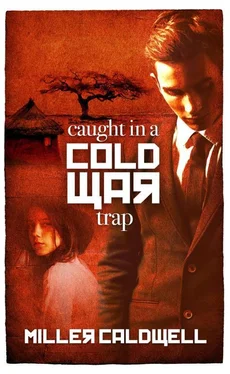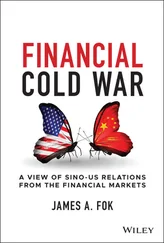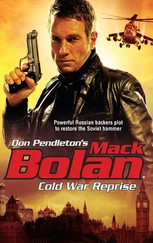I approached her, then stopped and stood still, about ten paces away. She glanced at me briefly and continued her focussed search behind me.
‘Is that not Morag Sutherland?’ I asked.
Still, there was no recognition but curiosity at what I had said.
‘My fiancée, Morag?’ I finally blurted out and ran with my arms open. We hugged briefly then we separated.
‘Goodness me, you look so different—and to be honest I don’t like that central parting.’
‘Nor do I, it has got to go.’
‘And the black hair?’
‘Yes, it’s going too. Come on, have you time for a coffee at the station cafe? I’ve much to tell you.’
Morag could see why the disguise was essential in leaving Accra and offered a restorative procedure back at her flat, dying my hair back to something close to its natural colour. What she had difficulty in accepting was my new name—Peter Clark.
‘Darling when we get married does this mean I marry a Harvie or a Clark?’
‘Let some water flow under the bridge,’ I began, but she stopped me immediately.
‘How are you going to explain that you are Mr Clark to my parents?’
I grimaced. ‘Well at least you can see why I had to do it.’
‘Yes, but my parents have been telling all our relatives and friends that I am engaged to Mr Robert Harvie.’
‘I see. So how much do your parents know my background?’
‘Not as much as you think. A Post-graduate languages student working with peanuts in Ghana is about as much as I’ve told them,’ she said with a laugh then as we clung together we kissed, like old times.
That night in her flat Morag asked me about the possible charges I might face over the five murders. Her concentration on me was almost overpowering.
‘The case died down after a while,’ I said with a sigh. ‘But on the plane, I wrote a letter to the Ghanaian High Commissioner in London. I told him about the Russians’ plot to assassinate the dissident Lorenzo Desoto using a tin of poisonous Quality Street chocolates. I explained that I was the courier who delivered them to him without knowing their significance. I told him everything, including about the children. I thought it important for them to know.’ A tear was not far from falling down my cheek. Morag held my arm and stroked it.
‘No one ever planned to murder four innocent children, but the blame has to be laid at the Russian Embassy in Accra for arranging the plot, and to the late Mr Utechin for carrying out the plan through me.’
Once more she looked at me with concern. ‘Did you sign the letter?’
I shook my head.
We agreed that that weekend, Morag would go home on Friday night with the sole intention of establishing me in the best possible light. She would give a full explanation of what had happened since we met at university, and how I had been trapped into being a Russian spy. She would say that those days were now over and that the British Ambassador in Accra had given me a new identity. The worst pill to swallow was the fact their daughter was soon to become a Clark and not a Harvie.
That same weekend I went home to my parents to explain my situation. They were mystified that my life could have followed such a path. Yet they saw I had survived and had matured through the process.
On Sunday night back in Morag’s flat, we assessed the families’ responses.
Morag said, ‘Let’s give our parents marks out of 10. 10 being no problem and 1 being a disaster and pressure to end our engagement.’
‘Wow, two extremes. Okay, we shout the numbers out at the same time, after the count of three. Ready?’
‘Just a moment,’ she said thinking through her parental encounter. I was sure of my response but hoped our results would be favourable. She nodded that she was ready.
‘Okay, 1, 2, 3—8.’
‘8’ We had shouted in unison. We hugged each other.
‘So tell me why not 10?’
Morag spent a thoughtful moment looking towards the ceiling. ‘I suppose just the embarrassment they feel having to tell their friends that Robert is really Peter,’ she giggled. ‘And for you?’
‘I suppose I didn’t write to them enough. That was the main problem but they are pleased that we have got back together.’
Morag went to the kitchen and opened a drawer.
‘Hey, what are you doing?’ I asked.
‘Making something to eat, that’s all.’
‘Well stop. Get your coat on.’
‘Why?’
‘Because I’ve just booked a table at the Ubiquitous Chip.’
By the time we met our parents again, my hair had found its natural parting, but the black hair was going to take longer to lighten and eventually disappear. In fact, our hair was not too dissimilar in colour. My beard had long since been shaved off.
I resumed studies to gain my teaching certificate and began teaching Spanish and Russian to secondary pupils at Shawlands Academy. The following summer Morag qualified as a doctor and worked at the Victoria Infirmary nearby, where my father was still the hospital’s chaplain.
I attended the Stewart Street Police Office monthly on the south side of the city for eighteen months. Thereafter a visit was required every two months and after a further six months, my requirement to report was terminated. In some ways, I enjoyed my visits. I got to know several police officers and found them to be polite and charming, despite seeing them arrive with men in handcuffs swearing like the proverbial troopers. Over the years, no retribution from the Russians came my way and I sometimes mentioned becoming Robert Harvie again but Morag was quite adamant we stayed as we were.
‘I’m not changing my name again and nor should you. It’s safer this way, for both of us.’
By then we were married and our first baby was on the way. That would be another issue—one day we would have to explain to our child why my surname was not the same as my father’s. But children adapt to life’s strangeness more easily than we do. I knew that one day my past would have to be shared with the next generation, and I hoped that by then Russia might be a more responsible nation. But I had my doubts.
Two years later I decided to write about my experience. Let me share the first page of the first chapter with you.
CHAPTER 1
Jura 1967
Have you ever been to the island of Jura? Not many people have. If you are a whisky connoisseur you possibly toured the island’s distillery to taste Isle of Jura single malt. Perhaps you were a climber assaulting the famous Paps of Jura, or a sailor assessing the treacherous cauldron of the Corryvreckan whirlpool from the safety of land. Maybe you needed to imbibe the presence of George Orwell (aka Eric Blair) who completed Nineteen Eighty-Four at Barnhill on the north of the island. That’s about all you can do on Jura, which is why not many go there. That however may be its attraction.
I was there during the Cold War years and there my spying career took roots. I was on a family holiday in July 1967. In the third week my life changed forever…
The End
Special thanks are due to David Watt, formerly of AFNOR (Association Française de Normalisation) the equivalent of the BSI (British Standards Institute) in the UK. A translator, reviser and proof-reader. What a friend he is indeed. To my agent Mathilde Vuillermoz, who keeps faith with me while answering all my demanding questions. And to Jocelyn who leaves me to daydream, walk the dog, garden, shop, and cook. In the process of these chores, I work out my next line.
Finally, I express my thanks to the Russian State for their gifts and without whom this book would not have been written… even although it does not show the Russian Government in a favourable light.
Читать дальше












